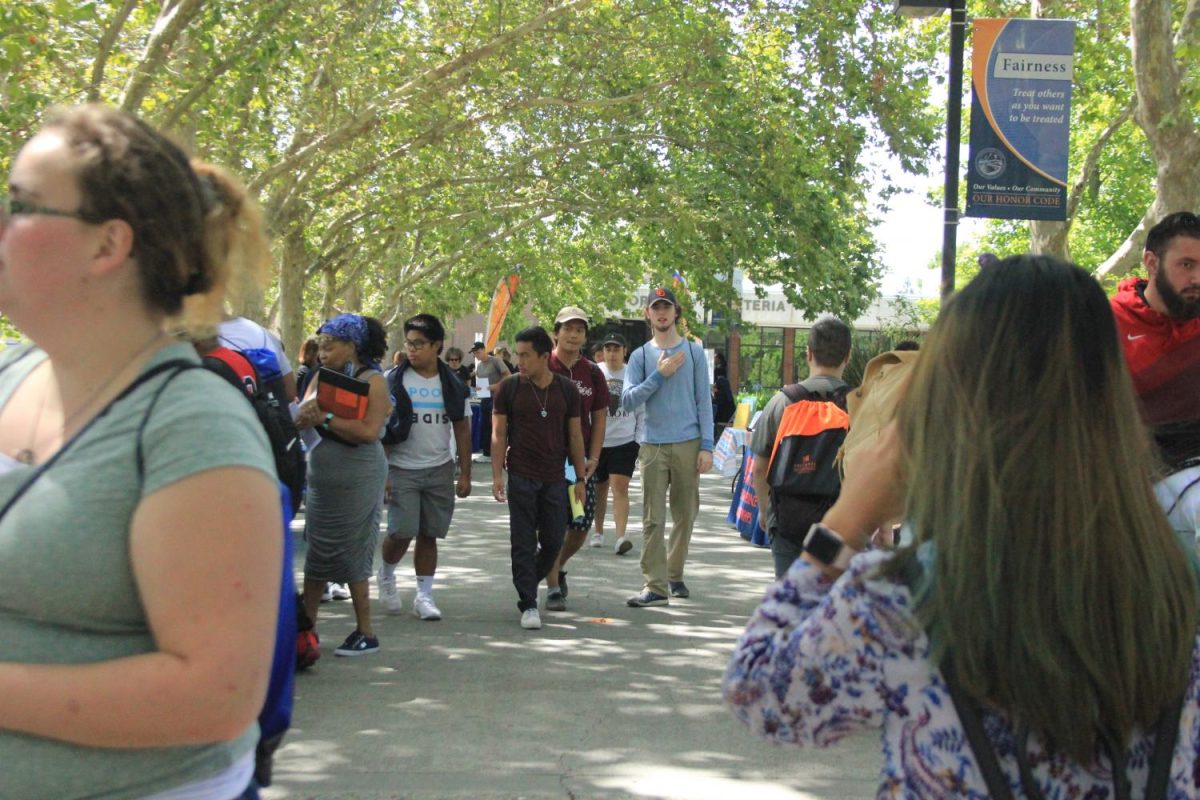Campus welcome event highlights departments and resources for incoming students
Students learn about the different departments and resources available on campus at the New Student Welcome on Aug. 15.
More than 700 new students gathered at Cosumnes River College on Aug. 15 for a New Student Welcome event put on for freshman to get to know CRC before starting the fall semester.
The New Student Welcome event, put on by the CRC Student Access Center, featured aspects meant to help first-time students at CRC by offering workshops, campus tours, and meet and greet panels with different departments.
“[CRC] is a college, and we want to give [students] the college experience, and we really want you to enjoy your academic experience as well as your social experience at college,” said Student Ambassador and Event Coordinator Marybeth Carranza.
Carranza said that aspects of the event were meant to help students navigate their way around CRC and help with their transition from high school to college.
Attending students were given a welcome package that came with materials such as agendas, school maps, CRC student binders, clips, USBs and pencils, said Carranza.
Students in attendance found the event to be resourceful in helping them get to know the college before they start the semester.
Natalie Cazares, 17, a biology major, said she came to the event to “learn more about CRC and get to know my way around.”
Workshops put on for students focused on building important student skills such as how to add classes, choose a career path and manage their time, Carranza said.
Booths and panels from different departments, resources, clubs and athletics were lined up for students to visit and seek out information.
Departments such as English, journalism, communication studies and child development had booths posted with professors showing students what each program has to offer.
English Professor Lisa Abraham advocated for the English Department as one that works well together to help students. She urged students to take their English classes early, as they will help students with future classes.
“Even if you’re a science major, an engineering major, an accounting major, literature classes help you develop ‘soft skills’ that make you an effective professional in the workplace, that make you an effective colleague,” said Abraham.
Student resources at CRC, such as financial aid, work experience, library services and counseling, also came out to share information with students.
Crystal Martinez-Alire, a counselor at CRC, said that counselors are available to help new students with their plans, narrowing down a major, exploring different careers and general support during their time at CRC.
CRC Counselor Paolo Soriano said that the counseling department wants to increase accessibility to students so students know they shouldn’t only come to see a counselor if something is wrong.
“We’re a crucial resource for them, essential resource if I may, to help them with their educational goals,” Soriano said. “We really believe in our ability to help and support students along the way.”
To help make counseling more accessible, CRC Counselor Christopher Torres said they have a Counseling Pop Ups program planned for the upcoming semester in which the counselors will be coming to the students with booths and tables set up in different areas all throughout the semester.
Athletics, clubs and campus organizations also took part in the event to showcase different things that new students can be a part of.
Different clubs and athletics were urging students to sign up for various teams or become members of different organizations.
Anthropology Professor Anastasia Panagakos was representing the Safe Spaces program at CRC and said she hoped new students would find Safe Spaces to be a resource when they need someone to turn to.
“A lot of students are feeling very uncertain about the future and what’s happening in our country in terms of our lives and who we are,” said Panagakos. “Now, more than ever, Safe Spaces feels really really relevant because we’re here to help everybody, but also to make sure that we try to keep our campus positive and inclusive.”

